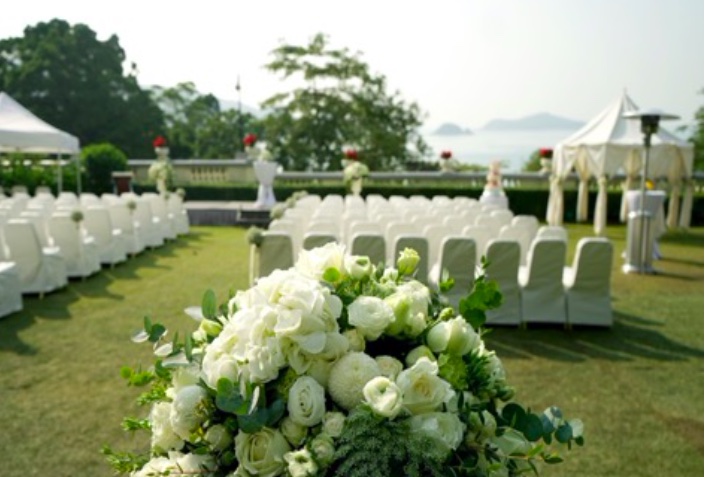Same-Sex Couples Must Pick Their Battles in Hong Kong Courts
By David S. Ma

The Repulse Bay Front Lawn, a popular wedding venue in Hong Kong. Photo by Jessie Fung
In 2018, three individuals independently applied for judicial review in Hong Kong to seek the recognition of same-sex marriage on constitutional grounds. This article summarizes the judgments of the Hong Kong Court of First Instance (“HKCFI”) on two of these applications. The third application (TF v Secretary for Justice HCAL2648/2018) was stayed, and there was no update at the time of writing.
THE FIRST CASE
The applicant in MK v Government of HKSAR HCAL 1088/2018 sought the following declarations:
(1) that the Marriage Ordinance was unconstitutional to the extent that it denied the right to marry to same-sex couples;
(2) that the Matrimonial Causes Ordinance was unconstitutional to the extent that it denied the right to marry to same-sex couples;
(3) that the failure on the part of the Hong Kong Government to provide an alternative legal framework , e.g. civil unions or registered partnerships (“Alternative Legal Framework”) to recognize same-sex relationships as an alternative to marriage under the Marriage Ordinance and the Matrimonial Causes Ordinance violated certain constitutional provisions.
The HKCFI acknowledged the applicant’s submission that the ability to acquire the status of marriage carried legal implications in the areas suggested by the applicant including without limitation
“adoption, bigamy, compellability of spouse at criminal trial, damages for personal injuries, dispute between husband and wife as to the title to or possession of property, divorce, fatal accidents, inheritance, insurance benefits, maintenance, medical decision, no recognition of foreign same-sex marriage, organ transplant, paternity leave, pension for surviving spouses, private columbaria, public columbaria, public housing application, reproductive technology procedure, sex discrimination against married persons, spousal benefits for civil servants, tax benefits and working family allowance scheme” (para 8).
The definition of a valid marriage under Hong Kong laws required that it be a voluntary union for life of one man and one woman. The applicant sought to challenge the element of “one man and one woman” based on the Basic Law (“BL”) and the Hong Kong Bill of Rights (“BOR”, which implemented the International Covenant on Civil and Political Rights (“ICCPR”) in Hong Kong).
Basic Law Article 37
The court focused its analysis on Article 37 of the BL:
“The freedom of marriage of Hong Kong residents and their right to raise a family freely shall be protected by law.”
The court found that “marriage” in Article 37 could only refer to heterosexual marriage, as this was the legislative intent expressed in the text of the law. At the time of promulgation of the BL on 4 April 1990 and at the time the BL came into effect on 1 July 1997, same-sex marriage was not recognized in Hong Kong or anywhere in the world. In addition, the Chinese text (which prevailed over the English) of the “right to raise a family” was translatable to “the right to voluntary childbearing”, which could not apply to same-sex couples. While the BL should be construed as a living instrument, it was clear that there was a “sharp division on public opinion” in Hong Kong as to whether the law should recognize same-sex marriages. As such, this was not a case for the court to update the legislative interpretation to meet the contemporary societal developments.
The court also held that “the right of men and women of marriable age to marry and to found a family” under BOR 19(2) could only be interpreted to mean opposite-sex marriages in accordance with the jurisprudence on the similarly-worded ICCPR 23(2) and the European Convention on Human Rights (“ECHR”) 12.
Lex Specialis
As the specific marriage protection clause in the BL and BOR did not confer the right to same-sex marriage, other general articles could not give rise to any such right pursuant to the maxim generalia specialisbus non derogant (the general does not detract from the specific). In this regard, the court distinguished Halpern v. Canada 2003 CanLII 26403 (ON CA) on the basis that the Canadian Charter of Rights and Freedom did not have a specific marriage protection clause.
Accordingly, the court found it unnecessary to consider the other sections that the applicant sought to rely on, namely, the freedom of conscience and religion, the freedom from arbitrary or unlawful interference, and the right to equality and non-discrimination.
Alternative Legal Framework
The applicant had referred to Oliari v Italy (2017) 65 EHRR 26 and argued that the Government had a positive obligation to provide an Alternative Legal Framework. The court found this to be unconvincing as the legal, social and political circumstances in Italy were different from those in Hong Kong. Furthermore, ECHR 8 provided for the positive right to respect for private and family life, while BOR 14 expressed it as a negative right to be free from arbitrary or unlawful interference. It was held that the Government had no positive legal obligation to provide an Alternative Legal Framework because:
(1) the court should examine substance over form in ascertaining rights, and as there was no legal right for same-sex couples to marry, the court could not seek to achieve the same results under the guise of a different label;
(2) this was “quintessentially a matter for legislation” and was beyond the “proper province of judicial functions”;
(3) it would be wrong in principle for the court to make such general declaration, as certain rights might require restriction or modification. The court cited the example of same-sex couples adopting a child and the need to protect the interests of the child to be adopted.
Application Dismissed
The court held that the denial of the right to marriage to same-sex couples under Hong Kong laws and the failure of the Government to provide the Alternative Legal Framework did not violate the constitutional rights of same-sex couples. The court noted that it was aware of the diverse views of society but needed to adopt a “strict legal approach” to reach its conclusion. It urged the Government to review the matter, as otherwise specific legislations might be challenged on an ad-hoc basis leading to “an incoherent state of the law at different times as well as much time and costs being incurred or wasted in the process” (para 57).
THE SECOND CASE
The applicant in Sham Tsz Kit v Secretary for Justice HCAL 2682/2018 sought the declarations that (1) Hong Kong laws excluding same-sex marriage were unconstitutional; (2) the failure of Hong Kong laws to provide an Alternative Legal Framework was unconstitutional; and (3) Hong Kong laws which did not recognize foreign same-sex marriages violated the right to equality under BOR 2 and BL 25 (“Ground 3”). The judgment focused on Ground 3 as the other grounds were already dealt with in the first case.
The applicant argued that Hong Kong laws violated the right to equality by recognizing foreign opposite-sex marriages but not foreign same-sex marriages. This constituted a differential treatment on the ground of sexual orientation and was a violation of BL 25 (“All Hong Kong residents shall be equal before the law”) and BOL 22 (ICCPR 26).
The HKCFI was of the view that while it was open to the applicant to challenge any particular law or policy, he could not seek a general declaration as a matter of principle. The applicable test for discrimination claims, set out in Leung Chun Kwong v Secretary for Civil Service (2019) 22 HKCFAR 127, required the complainant to establish that (1) he was treated differently to a person in a comparable or analogous position and (2) the reason for the differential treatment was based on the prohibited ground. As the assessment depended on the context and facts, the court rejected the implied contention of Ground 3 that opposite-sex married couples and same-sex married couples should always be regarded as being in a comparable and analogous position.
The court acknowledged that many government policies or laws might not withstand the scrutiny of a constitutional challenge on the ground of unlawful discrimination based on sexual orientation, but rejected the applicant’s attempt to “achieve complete parity of legal recognition” of foreign same-sex marriages and foreign opposite-sex marriages as “too ambitious” (para 26).
A Patchwork of Rights
HKCFI expressed sympathy for the applicants but was unable to grant the general declarations sought in these two cases. As noted in the judgments, Hong Kong courts have previously recognized that same-sex couples enjoyed constitutional protection to the right to equality in certain areas, namely married government employees benefits, dependent visas, public rental housing, and intestacy and inheritance. Until there is further judicial development or comprehensive legislative reform (which may in turn depend on the prevailing societal climate), same-sex couples will need to resort to incremental victories in the smaller battles before the war is finally won.
Bio:

David S. Ma, BBA (Law), LLB, PCLL (HKU); LLM (Stanford), is a Civil Celebrant of Marriages in Hong Kong and is interested in human rights and civil rights.